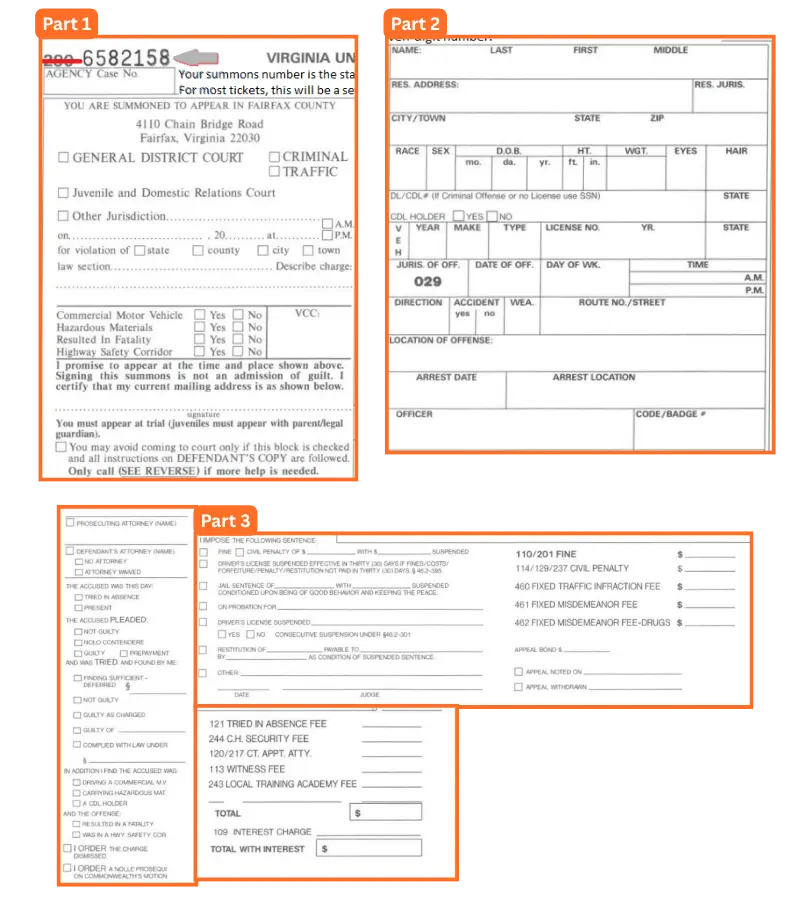Speeding is one of the most common violations in Virginia. Fines usually start at $6 for every mile over the speed limit, plus court costs, and can quickly add up. Driving 20 mph or more over the limit, or over 85 mph regardless of the limit, is considered reckless driving — a criminal offense in Virginia.
Virginia law bans handheld cell phone use while driving. Violations carry a $125 fine for the first offense and $250 for subsequent offenses. In highway work zones, fines are higher, and violations can add demerit points to your license.
Reckless driving in Virginia is a Class 1 misdemeanor. It can result in fines up to $2,500, 6 demerit points, license suspension for up to 6 months, and even jail time. Virginia is known for some of the strictest reckless driving laws in the U.S.
Running a red light or stop sign in Virginia generally results in a $200 fine and 4 demerit points on your license. Automated red-light camera tickets carry a $50 fine but no points. Insurance companies may still use the violation to raise rates.
Failure to yield to vehicles or pedestrians in Virginia carries fines around $100–$150 and 4 demerit points on your license. If the violation causes an accident, the penalties are more severe and can include license suspension.
Virginia allows uninsured drivers only if they pay a $500 Uninsured Motor Vehicle (UMV) fee — but driving without insurance or payment of the UMV fee is illegal. Penalties include license and registration suspension, reinstatement fees, and the requirement to file SR-22 insurance for three years.
To say it simply – we are your best chance at winning. Our pro lawyers have years of experience in courts, successfully slamming thousands of tickets.
We let you know if there’s a win in sight or if your ticket’s a lost cause. You can enjoy not being taken for a ride, just simple straight talk.
Submit your ticket and step back. We offer a valet-like service, taking on the mental load of your ticket, so you don’t have to.
Forget automated responses; at Flickit, you’re guaranteed support from real, empathetic humans – every step of the way. Message us and expect a call-back!
Leave the courtrooms to TV shows. Flickit handles all the real-life legal stuff, because who has time or patience for all that drama?
By keeping your license points down, you’ll avoid your insurance premiums from rising. That’s a lot of money at stake down the line.

In Virginia, a moving violation refers to any traffic violation that occurs while the vehicle is in motion. These violations typically include actions such as speeding, running red lights, improper lane changes, failure to yield, reckless driving, and driving under the influence (DUI) or driving while intoxicated (DWI). Moving violations are serious offenses that can result in fines, points on your driving record, increased insurance premiums, and even license suspension or revocation.When facing a moving violation in Virginia, Flickit can be your invaluable ally. Our traffic ticket lawyers in Virginia specialize in disputing traffic tickets. We understand the nuances of Virginia’s traffic laws and court procedures, and we’ll work tirelessly to build a strong defense and fight for your rights.
The number of points assigned to a moving violation in Virginia varies depending on the severity of the offense. Generally, moving violations can range from three to six demerit points, with more serious violations resulting in higher point assessments. These points are added to your driving record and can lead to consequences such as license suspension, increased insurance premiums, and difficulty obtaining employment in certain industries.Flickit’s traffic ticket lawyers in Virginia will work diligently to dispute tickets and protect your driving record, exploring every option to reduce or eliminate points.